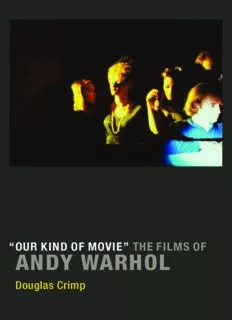
"Our Kind of Movie": The Films of Andy Warhol PDF
Preview "Our Kind of Movie": The Films of Andy Warhol
“Our Kind Of MOvie” 8127_000.indd 1 1/7/12 2:53 PM 8127_000.indd 2 1/7/12 2:53 PM “Our Kind Of MOvie” The Films oF Andy WArhol Douglas Crimp MIT Press CaMbrIDge, MassaChuseTTs LonDon, engLanD 8127_000.indd 3 1/7/12 2:53 PM © 2012 Douglas Crimp All rights reserved. No part of this book may be reproduced in any form by any electronic or mechanical means (including photocopying, recording, or information storage and retrieval) without permission in writing from the publisher. MIT Press books may be purchased at special quantity discounts for business or sales promotional use. For information, please email [email protected] or write to Special Sales Department, The MIT Press, 55 Hayward Street, Cambridge, MA 02142. This book was set in Helvetica Neue Pro by The MIT Press. Printed and bound in the United States of America. Library of Congress Cataloging-in-Publication Data Crimp, Douglas. “Our kind of movie” : the films of Andy Warhol / Douglas Crimp. p. cm. Includes bibliographical references and index. ISBN 978-0-262-01729-9 (hardcover : alk. paper) 1. Warhol, Andy, 1928–1987—Criticism and interpretation. I. Warhol, Andy, 1928–1987. II. Title. PN1998.3.W366C75 2012 700.92—dc23 2011034255 10 9 8 7 6 5 4 3 2 1 8127_000.indd 4 1/7/12 2:53 PM We DIDn’T ThInk of our MovIes as unDergrounD or CoMMerCIaL or arT or Porn; They Were a LITTLe of aLL of Those, buT uLTIMaTeLy They Were jusT “our kInD of MovIe.” Andy WArhOl 8127_000.indd 5 1/7/12 2:53 PM 8127_000.indd 6 1/7/12 2:53 PM ConTenTs PrefAce ix faCe vaLue 1 aDDenDuM: Eating too Fast 16 MarIo MonTez, for shaMe 20 aDDenDuM: MoTher CaMP 38 CoMIng TogeTher To sTay aParT 46 sPaCIous 68 MIsfITTIng TogeTher 96 MosT beauTIfuL 110 aDDenDuM: borIng CaMP 130 ePILogue: WarhoL’s TIMe 137 nOtes 147 index 163 8127_000.indd 7 1/7/12 2:53 PM 8127_000.indd 8 1/7/12 2:53 PM Preface I conceived this book as a book, not as the collection of essays it turned out to be—a consequence of the occasional way I almost always work. I had set out to write about 1960s New York City queer culture, the culture in which I happily immersed myself when I came to the city after college toward the end of that decade. It was to be an archaeology of a world for which I use the shorthand designation “the back room at Max’s,” because the room at the back of Max’s Kansas City, an art bar on lower Park Avenue near Union Square, was where I mixed with denizens of the underground film and off-off-Broadway theater scene. Once I got down to writing, though, things took their own course. First, the topic quickly changed to Andy Warhol’s films. I projected a book about a milieu that was meant to include Warhol and the Factory, certainly, but also a wide range of other underground filmmakers such as Jack Smith, the Kuchar broth- ers, Ron Rice, and José Rodriguez Soltero, together with the Theater of the Ridiculous in its different guises—the Play-House of the Ridiculous and the Ridiculous Theatrical Company.1 But I began with an essay on Warhol’s early film Blow Job and in the process discovered the full extent and richness of Warhol’s filmmaking, by itself much more than a book could comprehend. Like most of these essays, the one on Blow Job, “Face Value,” was written initially as a lecture. In the summer of 1998, I met the future museum curator Adam Budak while he was still studying at the Jagiellonian University in Krakow. He invited me to speak there, and that invitation extended eventually to a tour of various Eastern European venues, including the Center for Contemporary Art in Warsaw, the Adam Mickiewicz University in Poznan, and the Galerie Rudolfinum in Prague. A lecture on Blow Job posed some difficulties in still very Catholic and queer-unfriendly Poland. My translator in Warsaw, reproducing my talk successively, seemed to take unusually long to get each paragraph into Polish, longer than the precision of English often necessitates when rendered into another language. The audience grew more and more restive until finally some of them began yelling at the translator. Since I don’t speak Polish, I didn’t under- stand what was happening until I was told later by friends: The translator didn’t want to use the colloquial expressions for “blow job,” “hustler,” and so forth; nor, it seems, did he even want to use the clinical equivalents of “fellatio” and “male prostitute.” He attempted to talk his way around such unsavory notions altogether. Of course, this completely ruined my plainspoken prose and often made the sense of my talk incomprehensible, so Preface ix 8127_000a.indd 9 1/6/12 2:23 PM
Description: